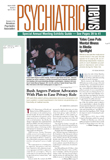The American Psychiatric Foundation invites annual meeting registrants to attend several special events at next month’s annual meeting. They include a session with Tipper Gore and information on charitable estate planning.
The American Psychiatric Foundation will launch its new educational series called “Conversations” with Tipper Gore as the inaugural speaker. This interactive discussion will focus on a wide range of issues important to psychiatry, as well as Gore’s own experiences in her battle with depression.
“We are thrilled that Mrs. Gore has accepted our invitation to launch our new Conversations event,” said Abram M. Hostetter, M.D., president of the foundation. “Mrs. Gore’s unique insights on mental illness will enrich all attendees and compliment the educational and scientific sessions of the annual meeting.”
A “Conversation With Tipper Gore” will be held Tuesday, May 21, at 5:30 p.m. at the Park Hyatt Hotel and is open to all annual meeting registrants at no charge. AstraZeneca has provided an unrestricted educational grant to support this program.
On Monday, May 20, the foundation will present an educational workshop by gift-planning expert Richard Barrett, president of Barrett Planned Giving Inc. The session, which will be held at the Park Hyatt Hotel at noon, will provide valuable charitable estate–planning strategies. Participants will learn how to reduce their current, future, and estate taxes and how to provide for a new stream of income now. They will also learn how they can provide support to favorite charities after their death while still ensuring that their heirs are well provided for.
Many people are unfamiliar with planned giving and therefore hesitate to become part of the foundation’s program. Barrett will show how a planned gift can maximize the benefits to donors and their families, as well as to their charity of choice. Barrett will also be available at the end of the workshop to answer questions from the audience and to explore specific estate-planning options based on goals and investment portfolio.
Foundation President Hostetter and his wife kicked off the foundation’s planned-giving program by establishing a charitable trust to benefit the foundation.
Hostetter said, “I believe strongly in the foundation’s ability to make a major impact on psychiatry. Planned giving provided me with the opportunity to support a cause I believe in, and because of the tax and income benefits, I was able to make a larger gift than I had anticipated.”
This workshop is free to all annual meeting attendees; however, preregistration is required by contacting Meghan Glynn by phone at (202) 682-6282 or by e-mail at
[email protected]. Box lunches will be provided.
More information about the American Psychiatric Foundation’s events and giving opportunities is posted on the foundation’s Web site at www.PsychFoundation.org. ▪
